Location
Our Seattle Location
Northpoint Seattle’s outpatient treatment program is located in beautiful Seattle, Washington, and we work to help the surrounding communities.
- Seattle
2111 N Northgate Way Suite 101,
Seattle, WA 98133, United States
You've overcome the denial, are finally facing the truth about your addiction to alcohol, and have decided it's time to give up the bottle for good. But now that you've made the choice to finally get better, what are the next steps?
If you're like most alcoholics considering giving up the bottle for good, you've probably heard a thing or two about how difficult going through alcohol withdrawal can be. And while the physical and psychological symptoms undoubtedly sound grueling, you may still be left wondering how long does alcohol detox take anyway?
It's a common question, and certainly one anybody going through detox is going to want to know ahead of time. So, let's take a closer look.
And along the way, let's take a deeper dive into what detoxification is, why alcohol withdrawals are so dangerous, and everything you stand to gain from partnering with a professional detox program rather than trying to tackle this addiction all on your own.
As with any other addictive substance, developing an alcohol use disorder means both your body and your brain have gotten incredibly used to having this drug in your system. In fact, being addicted often means you simply can't function without it.
Part of this dependency has to do with the physical changes that happen in your body over the course of your addiction. Certain chemicals may become a little bit stronger. Specialized cells might start shutting down and becoming inactive. And in most cases, these changes are responsible for your growing alcohol tolerance.
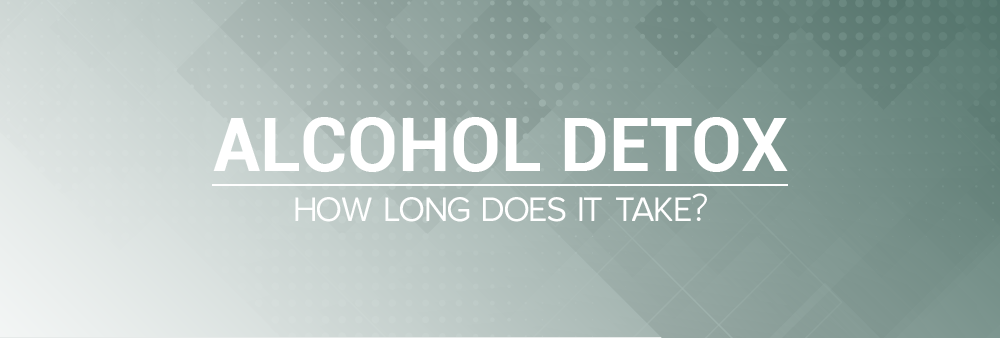
But these changes are all part of your body's effort to adapt to the frequent presence of alcohol coursing through your veins. And when you suddenly stop using alcohol, these physical changes can cause all sorts of uncomfortable symptoms to occur.
These are what are known as withdrawals, and they're what most people imagine when they think of detox.
And while they're undoubtedly the worst part of the process, these are often signs that your body is, in fact, getting back to normal.
In essence, then, your body has to re-adapt to functioning without the crutch of the bottle. And that can be a painful- and even life-threatening- process.
A professional detox program, however, will focus on making that process much more comfortable with the help of various treatments and therapies to ease withdrawals and reduce the likelihood of relapsing.
And when it comes to heavy-hitting addictions like alcoholism, a professional program can even save your life.
But more on that later.
First, let's take a closer look at alcohol detoxification and how long it usually lasts.
In most cases, going through alcohol withdrawals typically takes around 5 to 7 days. However, it's important to remember that nearly everyone will experience withdrawal differently.
For some patients, they may suffer through these uncomfortable symptoms for a few days but feel nearly back to normal soon after that. Others, however, may continue to experience withdrawals for weeks, months, and even years at a time. It simply depends on the individual.
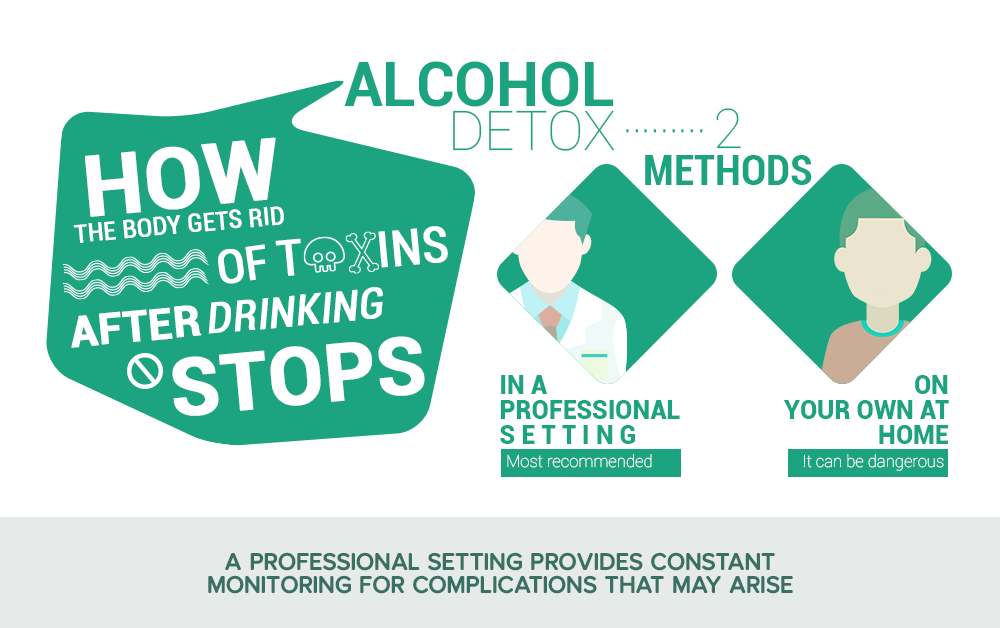
This is partly because there are so many different factors involved in how your body responds to detoxification. To give you just an idea of the complexity, just some of the most important factors are:
These factors only make up part of everything that's involved in how long your alcohol detox will last and what it will be like. As you might expect, then, predicting the exact amount of time it'll take you to get through the process or what it will be like is near impossible.
That being said, most alcohol detoxes follow a similar rate of progression and general timeline that begins once the alcohol has completely left your system.
Once again, the rate of breaking down and expelling alcohol from the body varies from person to person. Added to that, different types of alcoholic drinks take different amounts of time to metabolize.
According to Healthline, for instance, a small shot of liquor takes about an hour to break down while a pint of beer takes about 2 hours. On top of that, a large glass of wine takes about 3 hours to fully metabolize. This, of course, varies based on the alcohol content of the drink, your age and weight, and a number of other factors like liver health and any medications you're taking.
In general, though, the liver can break down alcohol at a rate of about 1 ounce per hour.
But alcohol can actually remain detectable in your system long after you've started sobering up. Urine tests, for example, can detect this drug for 12 to 48 hours after consumption. Breath tests are accurate for around 24 hours, and hair tests can actually see if someone has been drinking as far back as 90 days.
For the purposes of detoxification though, the only measure that really matters is how long alcohol stays in your bloodstream before it gets broken down. And after a night of heavy drinking, it usually takes at least 5-10 hours before your blood is clear of all its influence.
But even then, your withdrawals won't start for a few hours after you've eliminated all the alcohol in your body. As a result, most people will start going through detox around 8 hours after their last drink.
Many people will experience three general stages throughout their detox from alcohol. Have a look at each of the stages below to give you a better idea of what kinds of symptoms you can expect along the way as well as how long each stage typically lasts.
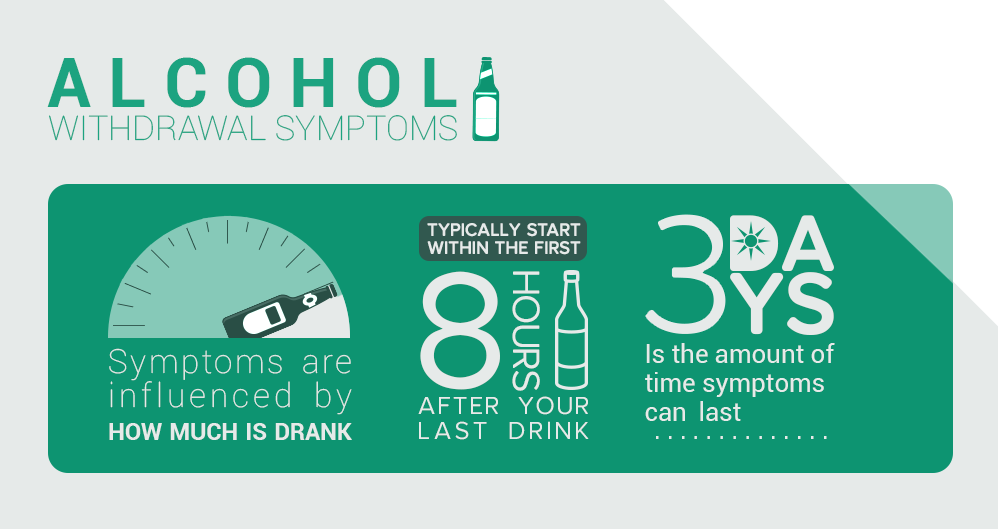
This first phase of detoxification usually begins around 8 hours after your last driugh some patients may not experience symptoms for days at a time. It usually lasts for around 12 to 24 hours. This stage is usually marked by the onset of some of the milder symptoms of withdrawal including:
The next phase of detoxing from an alcohol addiction usually begins around day 2ification and can last for up to 72 hours after your last drink. The 72-hour mark is typically considered to be the peak intensity of withdrawals. In addition to more severe ones experienced during Stage 1, some symptoms you can expect to feel during Stage 2 may include:
The third phase of alcohol withdrawal is characterized by a noticeable decline in sity of the symptoms. It will usually begin about three days after your last drink, and from there, most of the physical and psychological side effects will become far more manageable. By around day 5 to 7, you'll start feeling much more normal.
Alcohol is one of the only drugs with withdrawals that can be directly life-threatening. And when you're going through detox, it's important to know just when these types of symptoms can occur.
The two most dangerous symptoms are seizures and a terrifying syndrome known as delirium tremens (which we'll take a closer look at later).
For most alcoholics, detox will likely follow the three stages outlined above. And for many, you'll only have to push through the most intense physical withdrawals for around a week, maybe a little more. Rehab is still a necessity, of course, but after that, you'll likely start feeling like normal again.
But for others, getting back to business as usual can end up taking far longer- months or even years in some cases. For these individuals, they're likely experiencing what's known as Post-Acute Withdrawal Syndrome, also known as PAWS.
This condition is marked by a variety of different symptoms, many of which are more psychological in nature rather than physical. According to the Semel Institute for Neuroscience and Human Behavior at UCLA, these symptoms may include:
There still isn't a lot known about PAWS such as why it only affects some people or what's going on in the brain to really cause it. Some researchers believe that it has to do with the physical and chemical changes that occur over the course of addiction. These changes can make the brain more excitable when faced with stressful situations.
But within the addiction community, most experts agree that this condition is more than just a figment of the imagination. In fact, some estimate that as many as 90% of recovering opioid users experience at least some degree of PAWS. And when it comes to alcoholism, about 75% will go through some type of PAWS.
Treatment of PAWS usually consists of psychotherapy. However, Acamprosate, one of several drugs for treating alcohol addiction, has been shown to help alleviate some symptoms of PAWS. In general, though, working with a professional treatment center will often produce the best outcomes for patients with this condition.
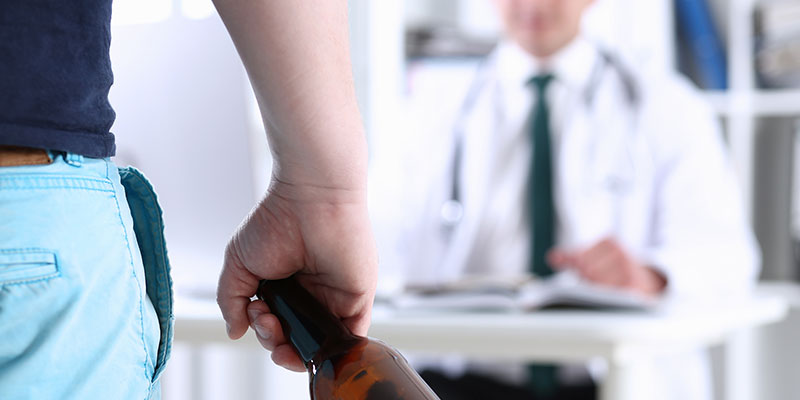
Just as there are countless factors involved in how long your alcohol detox will take, determining the type of withdrawals you'll experience is equally as complex. And consequently, predicting exactly how your body will react to detoxification is near impossible to do.
As the Substance Abuse and Mental Health Services Administration (SAMHSA) phrases it:
The course of these symptoms is extremely variable. An individual may progress partially through some of the symptoms noted [below] and then have a slow improvement. Other individuals may have mild to moderate symptoms with almost abrupt resolution. Yet another group may present with a grand mal seizure or with hallucinations. Some people with alcohol dependence, regardless of their pattern of drinking or the extent of drinking, appear to develop minor symptoms or show no symptoms of withdrawal.
As frustrating as it might be, then, your withdrawal is likely going to be unpredictable. However, most recovering alcoholics can expect to experience at least some of the symptoms of alcohol detox listed below at one point or another:
Yes, it most certainly is. In fact, along with benzodiazepines and opioids (to some extent), alcohol is one of the only drugs with withdrawal symptoms that can actually end up being directly fatal.
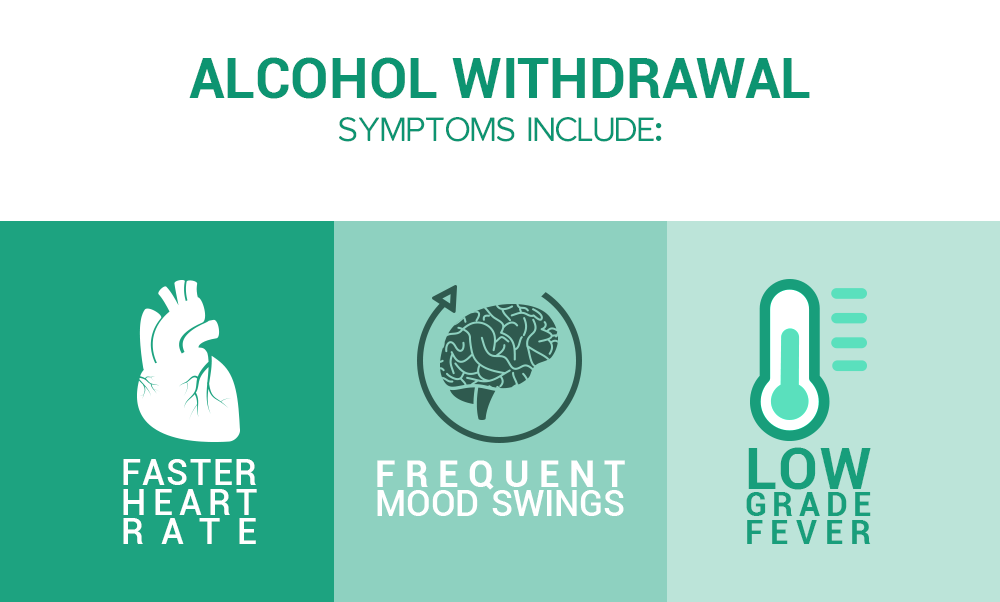
As we mentioned earlier, the two manifestations of deadly withdrawals when it comes to detoxing from alcohol are seizures and delirium tremens. Both of these conditions are caused by how alcohol interacts with a specific chemical in the brain known as GABA.
This chemical is largely responsible for calming the brain down, so to speak. And when you drink, this GABA becomes even more powerful- the relaxation, diminished inhibitions, and relief from anxiety associated with alcohol all come from a stronger GABA.
But over time, your body starts to compensate for the more potent version of this chemical by boosting the strength of glutamate, the brain's main excitatory chemical (i.e., the opposite of GABA). And when an alcoholic goes through detox, GABA quickly returns back to normal while glutamate stays just as powerful.
And since these two chemicals effectively evened each other out, this drastic change ends up launching the brain into a flurry of electrical overactivity, causing deadly grand mal seizures and in some cases delirium tremens.

A specific syndrome unique to especially severe cases of alcohol withdrawal, delirium tremens is a terrifying condition that's marked by a near-complete separation from reality. It occurs in around 5% of patients undergoing alcohol detoxification.
According to MedlinePlus, this condition is "is especially common in those who drink 4 to 5 pints (1.8 to 2.4 liters) of wine, 7 to 8 pints (3.3 to 3.8 liters) of beer, or 1 pint (1/2 liter) of "hard" alcohol every day for several months. Delirium tremens also commonly affects people who have used alcohol for more than 10 years."
In addition to the seizures that often present in patients experiencing delirium tremens, alcoholics may also die from other complications such as cardiac events, overheating, and more.
Some of the most common symptoms of delirium tremens are:
To give you just a quick indication of what it's like going through a nonfatal case of delirium tremens, have a look at this personal account.
When I stopped drinking, I was fantastically anxious. My ears were ringing and it felt like I was surrounded by static. In fact I felt like the world was closing in on me. I went to lunch at a regular place and I was sweating. I could not hear my lunch companion but I could see her lips moving and her eating, but the guy across the restaurant, 5 tables away, I imagined I could hear his conversation as clear as a bell. I returned to my office and I had a panic attack believing irrationally that if I continued standing or walking around I would be sucked out of my office window and that I would fall to my death. I laid down on my carpet and sunk my fingers into the pile of the carpet for safety. My heart was racing. Everything I looked at was washed out of colors or looked as if it had been burned out. I had intrusive thoughts and I could not sleep. The panic, the sweats, the crazy thoughts, the audio hallucinations, and the panic and racing thoughts continued for a few days but never as bad as this meltdown moment around the first day or two.
As you can see, going through alcohol detox can be painful, terrifying, and even life-threatening. And while it is possible to get through detoxification all on your own, it is highly recommended that you partner with a professional facility- especially because of the fatal withdrawals.
But there is more to working with a professional detox program than just keeping you safe and comfortable during your withdrawals. Below are just some of the most notable benefits of an expert treatment facility that some people may not have considered.
Not all detoxification centers are going to be the same. In addition to having different quality standards and safety measures, facilities can also be further separated by which treatment philosophy they tend to follow: medicated or holistic.
In general, most programs tend to use a hybrid of the two. But in order for you to better understand what type of treatments you'll be receiving when you choose to partner with a particular facility, it's important to understand the differences between each.
Medicated alcohol detox is a method that solely uses medications to help with alcohol withdrawal. Medical professionals will often put patients on a regimen of different prescription drugs to help ease withdrawals and sometimes to treat the cravings that can persist long after detoxification is over.
However, this treatment philosophy tends to be problematic for a couple of reasons.
First, many of these medications can end up being quite addictive. Klonopin and Xanax, for instance, can help reduce the severity of certain alcohol withdrawals but are often used as substances of abuse.
Added to that, many prescription medications often come with side effects of their own. And when you're already dealing with the long list of withdrawal symptoms that come from alcohol detox, these added effects might make the process more than you can handle.
While there are many different types of medications used to treat alcoholism in general, there are only a few designated for treating symptoms of withdrawal specifically.
The three main types of medications as pointed out by NIDA for treating alcohol withdrawals are benzodiazepines, adrenergic medications, and antiseizure medications.
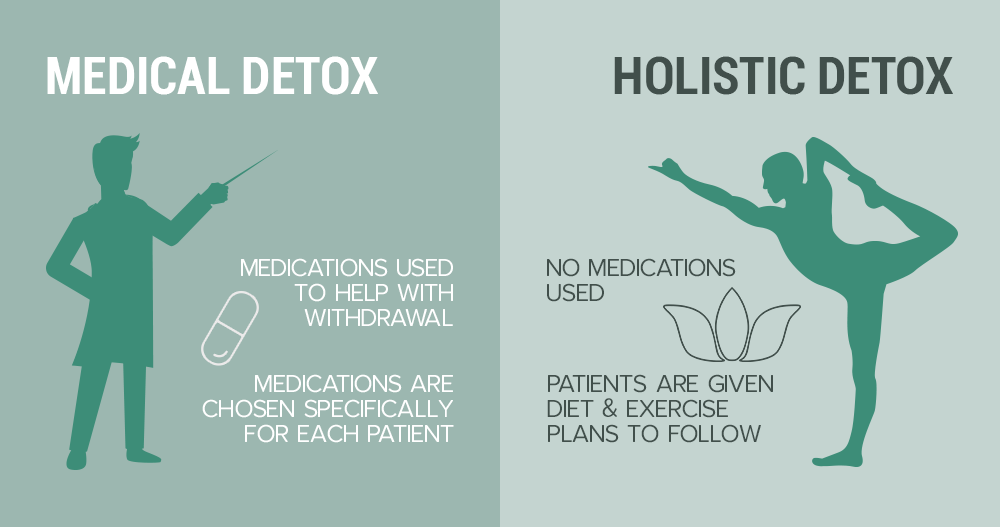
Holistic alcohol detox does not use medications to the same degree as purely medicated detox. Instead, this type of treatment supports the body's natural ability to detoxify on its own. As it turns out, the human body is already pretty good at flushing dangerous toxins from the system all on its own.
But since your body's gone through quite a bit over the course of your addiction, it'll likely need a bit of help along the way. And that's exactly what holistic detox is for.
The three main treatment categories that holistic alcohol detoxificationuses to help you get through withdrawals are nutrition plans, exercise regimens, and behavioral therapies.
A holistic alcohol detox program will often provide you with nutrition-rich meal plans that can help restore your body and help it heal from the damages caused by your addiction. And it can give it the nutrients it needs to fight off withdrawals even more effectively.

Going through alcohol detoxification on your own not only makes the process far more uncomfortable and even dangerous, but it can also significantly reduce the chances of achieving long-term sobriety.
And if you're finally ready to kick your alcohol addiction for good, there's no one better equipped to help you along the way than Northpoint Seattle. Our intensive outpatient facility in Bellevue, Washington offers the highest quality alcohol and drug rehabilitation services in the area.
We also work closely with numerous professional detox centers so that we can offer our patients the full spectrum of care and make recovery even easier.
With an empirically based program, a brand-new, modern facility, and individualized care that's been tailored to meet the specific needs of each patient, our holistic treatment program has just what you need to achieve sobriety- and hold onto it.
Sobriety is attainable. And with our help, it's more within reach than ever.
So, get in touch with us and let's begin your recovery today.

Our admissions coordinators are here to help you get started with treatment the right way. They'll verify your health insurance, help set up travel arrangements, and make sure your transition into treatment is smooth and hassle-free.
888.483.6031Contact Us